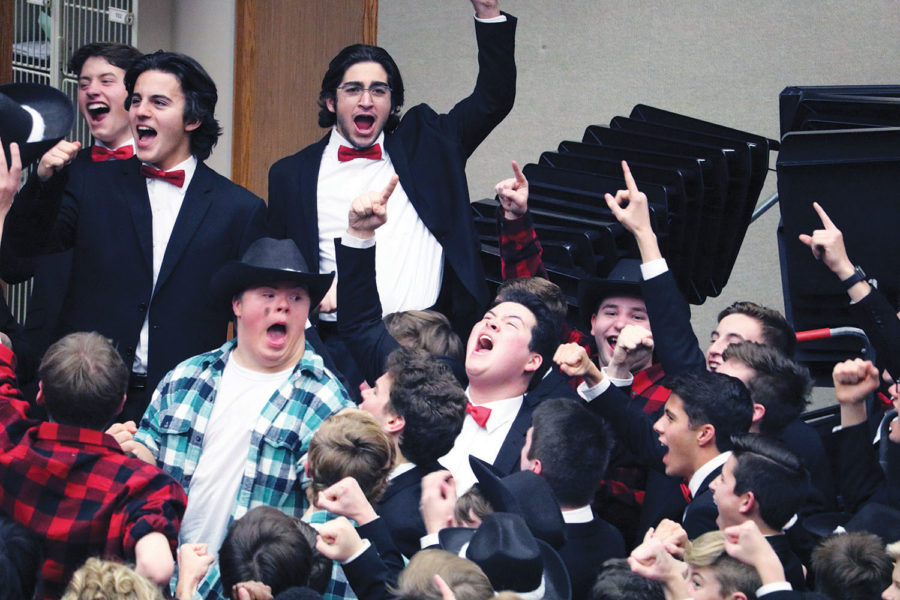Aidan Mellor, Ambassadors member and senior, actively participates in the school choir, and although he said he doesn’t personally believe in superstitions, he said before each performance, choir members follow a chant. He said this chant has become a mandatory ritual to set an optimistic atmosphere for a better performance.
“The chants have always been a staple of our performances and competitions and absolutely get all of us in a better headspace to perform,” Mellor said. “The chants always get us (to) focus on and only the present and help focus a lot of the groups collective nervous energy before the show.”
According to psychologist Linda Hinkle, superstitions and rituals like the ones Mellor participates in stem from anxiety and can psychologically improve performances. She said superstitions can hold a variety of benefits, which include boosting self-confidence and creating a sense of control.
Hinkle said, “Superstitions are often prevalent in situations involving fear and have been passed down through ancestral roots. There has been research that supersititons can improve performance by first raising confidence, which in turn helps a person execute their tasks better.”
 Mellor said his family has reinforced certain practices, but eventually he said he realized that these practices were more superstitious than cautionary. Beyond this, he said superstitions have not especially affected his life but have contributed to how he chooses to approach performances and important moments in his life.
Mellor said his family has reinforced certain practices, but eventually he said he realized that these practices were more superstitious than cautionary. Beyond this, he said superstitions have not especially affected his life but have contributed to how he chooses to approach performances and important moments in his life.
Similar to Mellor, Carol Syverson, tennis player and junior, said she has never been a superstitious person, but during tennis, there are actions players do to help them during the match.
“A thing tennis players do during the match oftentimes in between points is mess with their strings or kick their racket as a way to forget the last point,” Syverson said. She added how because tennis is such a mental sport, it’s more about what happens during the match and not before.
According to Fame 10, tennis player Serena Williams’s pre-game ritual includes sporting a pair of shower slippers to the court, tying her shoelaces a specific way, and wearing the same socks throughout the tournament. Similar to Williams, singer-songwriter Taylor Swift writes the number 13 on her hand before each performance and tries to incorporate the number into her life in any way possible as she believes it will bring her luck.
For both Mellor and Syverson, a superstitious element of their preparation for a match or performance is the chanting that occurs before the event. Mellor said two of the most common warm-ups the choirs perform include “Czechoslovakia” and “Take the Cake.”
“‘Take the Cake’ is one we always start with where we chant that and jump around and hype each other up,” Mellor said. “Another that we love is doing is called ‘Czechoslovakia,’ where we do a bunch of clapping and stomping and shouting in a specific order that gets progressively faster and more intense while in a circle.”
Mellor said the chants originated 10 to 15 years ago and have been part of every performance since.
He said, “The chants have their roots in tradition and assuring that the group is mentally ready to perform, but I think nowadays they do have a role in superstition especially for members who’ve been in the group for a long time.”
Similarly, Syverson said the tennis team creates a new chant each year to use for their matches and competitions. Both Syverson and Mellor said chants help improve their mindsets before the start of competitions and performances. Syverson said the chants help get the team fired up since each member gathers around the circle and participates in the chant.
While Syverson and Mellor routinely take part of these chants to pump up the atmosphere, Hinkle said it’s important to not take them too far or else they may have a negative impact.
“I think while these superstitions can be helpful in improving performances by boosting confidence, they can also cause unnecessary worrying to occur when it’s a bad superstition,” Hinkle said. “It’s important that people don’t base their decisions entirely off of superstitions.”
Mellor said although he is skeptical of superstitions, he said he believes people should follow what is most important to them.
“I’ve always felt that superstitious are most often rooted in anxiety or tradition,” Mellor said. “While this may make superstitions feel less important, it shouldn’t deter you from believing in what makes you feel secure or prepared for something.”




























![Keep the New Gloves: Fighter Safety Is Non-Negotiable [opinion]](https://hilite.org/wp-content/uploads/2024/12/ufcglovescolumncover-1200x471.png)
















































![Review: “We Live in Time” leaves you wanting more [MUSE]](https://hilite.org/wp-content/uploads/2024/12/IMG_6358.jpg)
![Review: The premise of "Culinary Class Wars" is refreshingly unique and deserving of more attention [MUSE]](https://hilite.org/wp-content/uploads/2024/12/MUSE-class-wars-cover-2.png)
![Introducing: "The Muses Who Stole Christmas," a collection of reviews for you to follow through winter [MUSE]](https://hilite.org/wp-content/uploads/2024/12/winter-muse-4.gif)
![Review: "Meet Me Next Christmas" is a cheesy and predictable watch, but it was worth every minute [MUSE]](https://hilite.org/wp-content/uploads/2024/11/AAAAQVfRG2gwEuLhXTGm3856HuX2MTNs31Ok7fGgIVCoZbyeugVs1F4DZs-DgP0XadTDrnXHlbQo4DerjRXand9H1JKPM06cENmLl2RsINud2DMqIHzpXFS2n4zOkL3dr5m5i0nIVb3Cu3ataT_W2zGeDAJNd_E-1200x884.jpg)
![Review: "Gilmore Girls", the perfect fall show [MUSE]](https://hilite.org/wp-content/uploads/2024/11/gilmore-girls.png)
![Review in Print: Maripaz Villar brings a delightfully unique style to the world of WEBTOON [MUSE]](https://hilite.org/wp-content/uploads/2023/12/maripazcover-1200x960.jpg)
![Review: “The Sword of Kaigen” is a masterpiece [MUSE]](https://hilite.org/wp-content/uploads/2023/11/Screenshot-2023-11-26-201051.png)
![Review: Gateron Oil Kings, great linear switches, okay price [MUSE]](https://hilite.org/wp-content/uploads/2023/11/Screenshot-2023-11-26-200553.png)
![Review: “A Haunting in Venice” is a significant improvement from other Agatha Christie adaptations [MUSE]](https://hilite.org/wp-content/uploads/2023/11/e7ee2938a6d422669771bce6d8088521.jpg)
![Review: A Thanksgiving story from elementary school, still just as interesting [MUSE]](https://hilite.org/wp-content/uploads/2023/11/Screenshot-2023-11-26-195514-987x1200.png)
![Review: "When I Fly Towards You", cute, uplifting youth drama [MUSE]](https://hilite.org/wp-content/uploads/2023/09/When-I-Fly-Towards-You-Chinese-drama.png)
![Postcards from Muse: Hawaii Travel Diary [MUSE]](https://hilite.org/wp-content/uploads/2023/09/My-project-1-1200x1200.jpg)
![Review: "Ladybug & Cat Noir: The Movie," departure from original show [MUSE]](https://hilite.org/wp-content/uploads/2023/09/Ladybug__Cat_Noir_-_The_Movie_poster.jpg)
![Review in Print: "Hidden Love" is the cute, uplifting drama everyone needs [MUSE]](https://hilite.org/wp-content/uploads/2023/09/hiddenlovecover-e1693597208225-1030x1200.png)
![Review in Print: "Heartstopper" is the heartwarming queer romance we all need [MUSE]](https://hilite.org/wp-content/uploads/2023/08/museheartstoppercover-1200x654.png)




